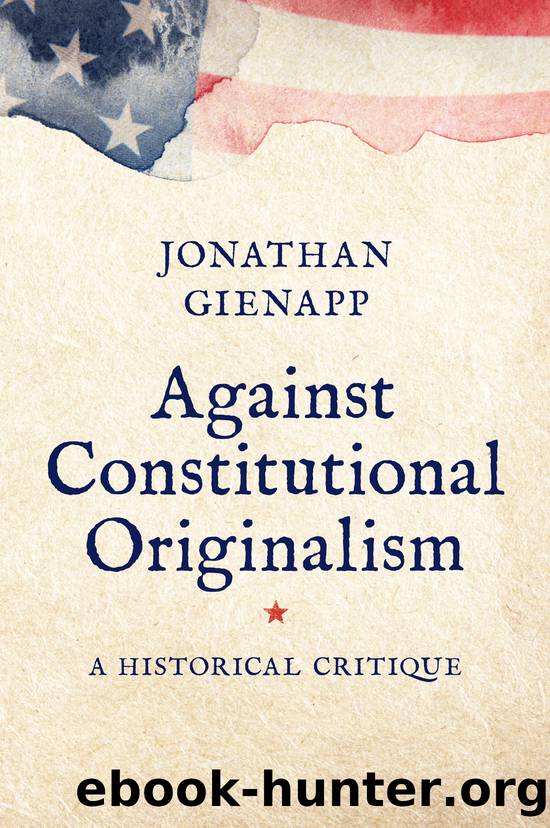Against Constitutional Originalism by Jonathan Gienapp

Author:Jonathan Gienapp
Language: eng
Format: epub
ISBN: 9780300280364
Publisher: Yale University Press
From Past to Present
Appealing to the past has always been profoundly important to American constitutional interpretation, and it was especially so in the half century following the Constitutionâs inception. But we shouldnât misunderstand what all that talk of history supposedly signaled. Despite its dominance, it didnât offer any consensus on how to interpret the Constitution but rather channeled disagreement no less fierce that what we now know. We shouldnât lose sight of the extent of those earlier disagreements.
As weâve seen, both Jefferson and Marshall appealed to the history of the founding moment. Yet they violently disagreed over how to approach that history and what one could claim to find there. And that was in large measure because they simply disagreed about the character of constitutional interpretation itselfâa disagreement that was far simpler than anything that hinged on the use history. Jefferson championed strict construction and Marshall broad construction. Long before the originalism debate swallowed everything up, thatâs actually what Americans fought over. And as obvious as it may seem to remind all of us of that earlier fault line, itâs one that is surprisingly hard to place in our modern debates.
The âwere the Founders originalists?â obsession has proved so hard to suppress, in large measure because itâs not clear how the âstrict construction versus broad constructionâ debate maps onto the âoriginalism versus living constitutionalismâ one. Because originalists have needed to solve so many interpretive dilemmas and have been happy to take the theory in so many different directions, originalism can now seemingly permit the strictest of strict construction or the broadest of broad construction. The imperative is to recover original meaning, however strictly or broadly that recovery entails. Consequently, the theory now happily accommodates a host of interpretive moves and impulses that, in Jefferson and Marshallâs time, were sharply and irreconcilably opposed. This state of things has bred considerable confusion. Do a strict-construction originalist and a broad-construction originalist agree on interpretive method? Few would have thought so in the nineteenth century. Do a broad-construction originalist and a living constitutionalist disagree on interpretive method? It often is hard to see exactly how, much as originalists insist otherwise.
We can begin to make sense of this muddle by coming to terms with how we got hereâby appreciating the sheer contingency of the originalismâliving constitutionalism divide. If certain early twentieth-century Americans faced with the modernist predicament hadnât chosen to defend the idea that the Constitutionâs meaning had evolved, we likely never would have lost touch with the âstrict versus broad constructionâ debate. If we still found ourselves in something like that world, it likely wouldnât matter who claimed fidelity to the original Constitution (be it the Constitutionâs intent, text, spirit, or purpose), but whether they were committed to the Jeffersonian or the Marshallian side of the earlier debate. The Jeffersonian likely would recoil no less at the modern originalist defense of Brown v. Board of Education than at President Franklin Delano Rooseveltâs defenses of the New Deal as consistent with the guiding principles of
Download
This site does not store any files on its server. We only index and link to content provided by other sites. Please contact the content providers to delete copyright contents if any and email us, we'll remove relevant links or contents immediately.
2010-The City & the City by China Miéville(1993)
Anatomy of Injustice by Raymond Bonner(1670)
That Every Man Be Armed by Stephen P. Halbrook(1583)
ADHD on Trial by Michael Gordon(1579)
Injustices by Ian Millhiser(1502)
You Don't Own Me by Orly Lobel(1448)
Tell by Major Margaret Witt(1446)
Course Correction by Ginny Gilder(1413)
Broken Scales by Joel Cohen(1354)
Without Copyrights by Spoo Robert(1352)
A Vast Conspiracy by Jeffrey Toobin(1332)
First by Evan Thomas(1291)
J by Howard Jacobson(1263)
A Religious Orgy in Tennessee by H.L. Mencken(1256)
The Run of His Life: The People v. O. J. Simpson by Jeffrey Toobin(1216)
A Triumph of Genius: Edwin Land, Polaroid, and the Kodak Patent War by Ronald K. Fierstein(1205)
A History Of Thailand by Baker Chris(1198)
John Wayne Gacy by Judge Sam Amirante(1115)
Law 101: Everything You Need to Know About American Law, Fourth Edition by Jay Feinman(1105)
